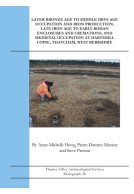Iron Age Settlement and A Roman Villa at Bowdens Lane Quarry, Huish Episcopi, Langport, Somerset (Paperback)
Imprint: Thames Valley Archaeological Services
Series: TVAS Monograph Series
Pages: 250
ISBN: 9781911228684
Published: 31st July 2024
Script Academic & Professional
Series: TVAS Monograph Series
Pages: 250
ISBN: 9781911228684
Published: 31st July 2024
Script Academic & Professional
Usually available in 6-8 weeks.
You'll be £25.00 closer to your next £10.00 credit when you purchase Iron Age Settlement and A Roman Villa at Bowdens Lane Quarry, Huish Episcopi, Langport, Somerset. What's this?
+£4.99 UK Delivery or free UK delivery if order is over £40
(click here for international delivery rates)
Order within the next 11 hours, 3 minutes to get your order processed the next working day!
Need a currency converter? Check XE.com for live rates
(click here for international delivery rates)
Order within the next 11 hours, 3 minutes to get your order processed the next working day!
Need a currency converter? Check XE.com for live rates
Excavations in advance of mineral extraction revealed extensive archaeological remains spanning the early Bronze Age to the late Roman periods, with a few later features. The chief periods of activity were the later Bronze Age to early Iron Age, the middle Iron Age and early through to later Roman times. An extensive spread of deposits has been interpreted as a midden, rich in Later Bronze Age to early Iron Age pottery, which is a well-recognized 'feature' type for the period, albeit still rarely found, as preservation especially over such a wide area as here must be assumed to be rare. The prehistoric ceramics, mainly from this 'midden', form a regionally significant group. Iron Age roundhouses in two foci were accompanied by numerous pits and several 4-poster 'granaries', suggesting a protracted occupation in this period.
A further ring gully seems to have been the site of an early Roman roundhouse, and this was soon followed by a sequence of rectangular stone structures which by the 3rd century would merit the designation as a villa, albeit a very modest one. Two structures appear to be corn-drying ovens, although it is not ruled out that the more elaborate one was a small plunge bath. A notable aspect of the site is the presence of human burials, perhaps in all the main periods of use and certainly in the later Roman phase. Isotope analysis suggests that all three of the individuals sampled originated in a colder climate than south-west Britain. The site chronology is supported by a series of radiocarbon dates.
Other titles in the series...
Other titles in Thames Valley Archaeological Services...










